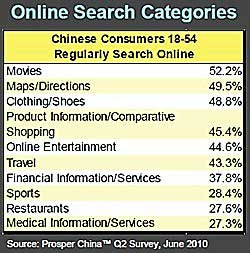With a population of over 1.3 billion, not only does China have more Internet users than any other country, but 81.4% of Chinese consumers age 18-54 say surfing the Internet is a favorite way to spend free time, making it a top leisure activity in China, according to a survey from Prosper China.
Baidu continues to dominate search in China: 76.0% of Chinese consumers age 18-54 use Baidu as their primary search engine. What are Chinese consumers searching for via the Web?
Movies (52.2%) and maps (49.5%) top the list of categories most often searched for among Chinese consumers age 18-54, followed by information on apparel (48.8%), and general product information (45.4%).

Younger Chinese consumers (age 18-34) are more active online, searching for information on movies (60.6%), clothing and shoes (52.5%), and online entertainment (50.6%).
Older Chinese consumers (age 35-54) are more inclined to search for maps and directions (49.9%), information on travel (45.6%), or general product information (45.7%).
Researching Products and Buying Online
Some 56.3% of Chinese consumers age 18-54 regularly research products online before purchasing in store. Younger consumers are more likely than older consumers to research online before buying (58.6% vs. 54.3%).
Fully one-half (50.8%) of younger Chinese consumers regularly purchase products online, as do 42.5% of older Chinese consumers.
Below, other findings from the Prosper China Q2 Survey of 18,089 Chinese Consumers age 18-54.
Auto and Grocery Buying Decisions
Digital media's influence on Chinese shoppers' purchases varies by category and age, but overall, digital media is more effective in influencing automobile purchases than grocery purchases.
When looking for auto information, older Chinese consumers are more influenced by Internet advertising than younger consumers (14.9% vs. 13.5%). Older Chinese consumers are also more influenced by blogging than younger consumers (12.9% vs. 12.6%).
In the grocery category, younger consumers are more influenced by Internet advertising than older consumers (10.3% vs. 8.8%), and younger consumers are more influenced by social media than older consumers (8.3% vs. 7.5%).
Online Activities for Fun and Entertainment
The most popular online activities among Chinese consumers age 18-54 include the following:
- Exchanging instant messaging, chatting: 54.2%
- Downloading music and video: 42.7%
- Reading up on celebrity gossip: 39.3%
Overall, adoption levels are significantly higher among younger Chinese consumers, except in the categories of stock marketing and business news (15.7%), and weather (16.1%).
Websites for Fun and Entertainment
The sites most visited for fun and entertainment among younger Chinese consumers include the following:
- QQ.com (popular free instant-messaging computer program): 28.7%
- Sina.com.cn (largest Chinese language infotainment Web portal): 13.5%
- Xunlei.com (download manager):12.3%
Meanwhile, 29.6% of those age 35-54 visit QQ.com, 21.2% visit Sina.com.cn, and 14.8% prefer Web portal 163.com.
To gather online line news, younger Chinese consumers head to qq.com (45.8%), sina.com.com (21.8%), and 163.com (16.9). Similarly, older Chinese rely on Sina.com.cn (43.3%), QQ.com (33.0%), and 163.com (18.4%).
Looking for great digital marketing data? MarketingProfs reviewed hundreds of research sources to create our most recent Digital Marketing Factbook (May 2010), a 296-page compilation of data and 254 charts, covering email marketing, social media, search engine marketing, e-commerce, and mobile marketing. Also check out The State of Social Media Marketing, a 240-page original research report from MarketingProfs.
Chinese Economy Continues to Expand
As of the second quarter of 2010, China became the second-largest economy in the world (after the US), reporting a gross domestic product (GDP) of 1.337 trillion, overtaking Japan's 1.288 trillion for the same period.
The Chinese economy is now forecast to overtake the US' (with a current annual GDP of about $14 trillion) as the world's largest economy by 2027.
E-commerce Going Mainstream in China
Online Chinese consumers are increasing their use of computers and mobile phones to shop: In the first nine months of 2009, China's 380 million online consumers spent roughly $25 billion online, twice as much they did in the previous year, according to a Forbes post by Shaun Rein, of China Market Research (CMR).
"Recently, consumers in third- and fourth-tier cities with incomes buoyed by China's stimulus program have started buying online to get things they can't find in stores near their homes," writes Rein.
E-commerce growth in China has been facilitated by a number of factors, according to separate research from CRM, including the following:
- Safer and more dependable online payments due to increased numbers of credit cards among consumers, from 15.3 million in 2005 to 240 million in 2010.
- The widespread adoption of the online retail payment platform Alipay, from Alibaba.
- Improved physical delivery of consumer products, helped by private couriers establishing national distribution networks to supplement the state-run postal system.
Consumers are also increasingly influenced by digital and social media marketing, according to Rein. "Brand managers should rethink their marketing budgets with an eye toward allocating more to social media sites like Tencent."
About the data: Findings are from a survey of 18,089 Chinese consumers age 18-54, conducted by Prosper China in June 2010.



